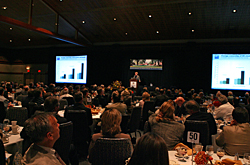Although there are concerns about the housing market, and the indirect impact that could have on some consumer spending, Cohen said she does not think a recession is looming because other sectors of the economy remain robust and “the period of economic expansion will last.”
In opening her talk, Cohen said the conference is an important one. “The conversation you are having here at Delaware is similar to the sorts of conversations that should be happening everywhere,” she said.
During her presentation, Cohen covered several basic themes she said should drive people's thinking on the economy, corporate performance and other issues, including education, the health and welfare of workers, and the condition of the environment.
Cohen said both the global economy and the U.S. economy are changing. In the U.S., she cited the problem in the housing market, but added that market is not monolithic and while some parts of the nation are “feeling pain” others are seeing stable or rising home prices.
On the plus side, she noted that American exports are growing 8-10 percent per annum, a growth rate two times as fast as the overall economy. And she said nonresidential construction is going up at a 15 percent annualized rate.
Growth in technology has exceeded that of all other sectors, Cohen said, adding technology is among the most important investments that can be made because it serves to bolster the productivity of workers. That benefits both the company and the worker, in the form of wages.
“It is easy to get caught up in those sectors of the economy that are having trouble but keep in mind we have a broad, diverse economy,” Cohen said. “We believe the U.S. economy is basically solid. There are questions in housing and consumer spending, but other factors make us feel more comfortable.”
The future may bring inflation and interest rates somewhat higher, and Cohen acknowledged concern over oil, which is fast approaching $100 per barrel. But, she said that, in general, commodity prices are holding the line.“All commodities combined, including energy, are responsible for less than 10 percent of business cost in U.S. I do not see inflationary surges coming from commodity prices at this time,” she said.
Cohen addressed market volatility, which she defined as “jumpiness.” In recent months, there has been a spike in volatility but she pointed out that when long-term trends are reviewed, this “barely registers.”
Cohen said a growing trend in investment is environmental awareness. She said she believes capital markets are “at critical mass” in regards to investment in companies in the environmental fields.
Assets controlled by Investor Network on Climate Risk (INCR) participants now exceeds $4 trillion, she said, adding that is now a significant percentage of the U.S. stock market and does have an impact.
Article by Neil Thomas
Photos by Kathy F. Atkinson



